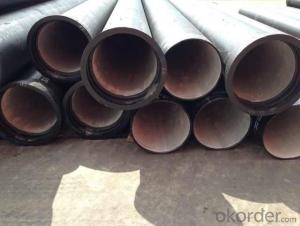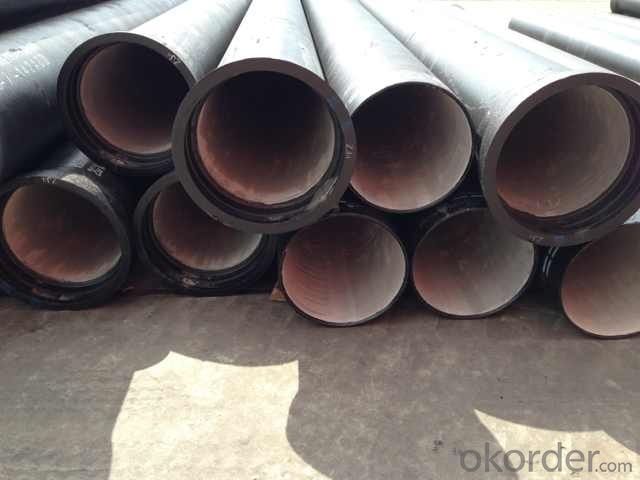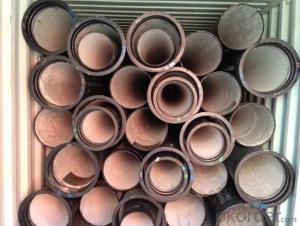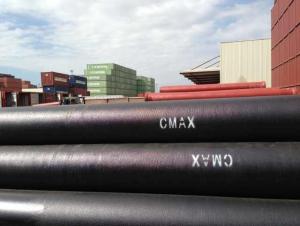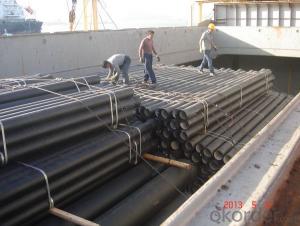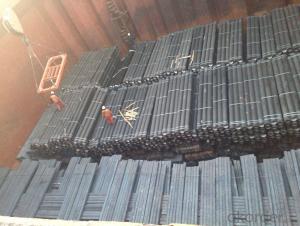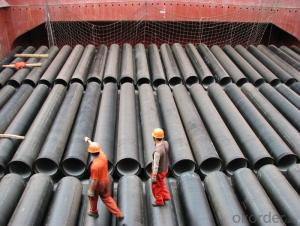DUCTILE IRON PIPE DN450 K10
- Loading Port:
- Tianjin
- Payment Terms:
- TT OR LC
- Min Order Qty:
- -
- Supply Capability:
- 30000Tons m/month
OKorder Service Pledge
OKorder Financial Service
You Might Also Like
CNBM ductile iron pipe ranges from DN80-DN1600mm (T-Type, Class K9), effective length 6m, comply with ISO2531 Standard
Company Profile
CNBM International Corporation is the leading production base and renowned supplier of Ductile Iron Water Pipe systems of both potable and waste water in China. We are constantly looking to develop high quality products to ensure the longest service life and wonderful performance.
CNBM Pipelines regard quality as the essential factor leading to successful business. Every pipe is tested in accordance with BS EN545 (water application) or BS EN598 (sewer application). CNBM Pipelines products comply with and are tested according to the relevant European and International Standards. Our pipes are manufactured under the quality management system BS EN ISO 9001. After years of efforts, CNBM Pipelines has built up great reputation in terms of quality and service among customers worldwide
Product Introduction
CNBM ductile iron pipe ranges from DN80-DN1600mm (Tyton, T-Type, Class K7/K8/K9), effective length: 6m, complying with BS EN545/EN598/ISO2531/BS4772.
Specification& Payment terms
Internal lining: Pipes shall have an internal cement mortar lining in acc with ISO4179.
External coating: Pipes shall be externally coated with metallic zinc spray plus a further layer of resin painting to ISO8179.
Gasket: 100% SBR/NBR/EPDM gasket in accordance with ISO4633.
Packing: Pipes from DN100 to DN300 be bundled with steel belts, the others are in bulk.
Payment term: By 30% T/T advance payment + 70% Irrevocable L/C at sight.
Packing: In bulk vessel or in container.
- Q: Are ductile iron pipes suitable for use in irrigation gate systems?
- Indeed, irrigation gate systems can benefit from the use of ductile iron pipes. Ductile iron, a variant of cast iron, boasts superior strength and flexibility, rendering it a reliable and long-lasting option for applications like irrigation gate systems. Ductile iron pipes are famed for their remarkable tensile strength and resistance to corrosion, features that are crucial for preserving the integrity of the irrigation system. Moreover, these pipes can endure high pressure and offer an extended lifespan, making them a cost-efficient solution for irrigation gate systems. In summary, the strength, durability, and corrosion resistance of ductile iron pipes make them highly suitable for use in irrigation gate systems.
- Q: Can ductile iron pipe be used for irrigation pumping stations?
- Yes, ductile iron pipe can be used for irrigation pumping stations. Ductile iron pipe is commonly used in various applications, including irrigation systems, due to its durability and strength. It has high tensile strength and can withstand high pressure and heavy loads, making it suitable for irrigation pumping stations. Additionally, ductile iron pipe is resistant to corrosion, which is beneficial in irrigation systems where water is present. It is also easy to install and maintain, making it a cost-effective choice for irrigation projects.
- Q: Can ductile iron pipe be used for chemical processing plant applications?
- Yes, ductile iron pipe can be used for chemical processing plant applications. It is durable, corrosion-resistant, and has high tensile strength, making it suitable for transporting various chemicals and fluids in such environments. Additionally, its flexibility and ease of installation make it a practical choice for piping systems in chemical processing plants.
- Q: Can ductile iron pipes be used in marine environments?
- Ductile iron pipes are suitable for marine environments due to their excellent mechanical properties, high corrosion resistance, and durability. These pipes are made of a type of cast iron known as ductile iron, which can withstand the harsh conditions of marine environments. Marine environments are known for their high levels of corrosion caused by saltwater, humidity, and other harsh factors. However, ductile iron pipes are specifically designed to endure these conditions. They have a protective layer called the "graphite skin" that acts as a barrier against corrosion. This graphite skin prevents rust formation and safeguards the pipes from degradation. Additionally, ductile iron pipes can be further protected with coatings or linings to enhance their corrosion resistance in marine environments. These protective coatings, such as epoxy, polyurethane, or zinc coatings, provide an extra layer of defense against corrosion. This ensures the pipes' longevity and reliability in marine environments. To maintain optimal performance, regular maintenance and inspection are crucial for ductile iron pipes in marine environments. This includes regular cleaning to remove marine growth or debris that may accumulate on the pipes and conducting routine inspections to identify any signs of corrosion or damage. In conclusion, ductile iron pipes are a suitable choice for marine environments. Their inherent corrosion resistance, durability, and the ability to apply additional protective coatings make them ideal for various marine applications.
- Q: Are ductile iron pipes resistant to hydrogen sulfide corrosion?
- Yes, ductile iron pipes are generally resistant to hydrogen sulfide corrosion. Ductile iron is a type of cast iron that has been treated with magnesium to create a more flexible and durable material. This treatment significantly enhances its resistance to corrosion, including corrosion caused by hydrogen sulfide. The magnesium in the ductile iron forms a protective layer on the surface, preventing the penetration of hydrogen sulfide and other corrosive agents. However, it is important to note that the resistance of ductile iron pipes to hydrogen sulfide corrosion can still be influenced by factors such as the concentration and duration of exposure to the corrosive environment. Therefore, proper maintenance, regular inspection, and appropriate protective measures should still be implemented to ensure the long-term durability and performance of ductile iron pipes in the presence of hydrogen sulfide.
- Q: Are ductile iron pipes suitable for use in agricultural applications?
- Yes, ductile iron pipes are suitable for use in agricultural applications. Ductile iron pipes are known for their high strength and durability, making them ideal for withstanding the heavy loads and pressures often found in agricultural operations. Additionally, they have excellent corrosion resistance, which is important in agricultural environments where pipes may be exposed to chemicals or fertilizers. Ductile iron pipes also have a long lifespan, reducing the need for frequent replacements and minimizing maintenance costs. Overall, their robust nature and ability to handle various agricultural demands make them a reliable choice for use in agricultural applications.
- Q: What is the typical weight of ductile iron pipes?
- The typical weight of ductile iron pipes can vary depending on their size and thickness. However, as a general guideline, ductile iron pipes commonly range in weight from around 1 pound per foot for smaller diameter pipes to several hundred pounds per foot for larger diameter pipes. The weight of ductile iron pipes is determined by factors such as the pipe's dimensions, the thickness of its walls, and the specific requirements of the intended application. It is important to note that these weights are approximate and can vary based on the specific manufacturer and product specifications.
- Q: What is the process of fusion bonding for ductile iron pipes?
- Fusion bonding for ductile iron pipes is a process that involves heating the pipes to a specific temperature and then applying pressure to fuse the ends of two pipes together. This creates a strong and durable bond between the pipes, ensuring a leak-proof connection. The fusion bonding process is commonly used in the construction and maintenance of underground water and sewer systems.
- Q: How much pressure can the ductile iron pipe socket meet?
- If it is a general installation, you can rest assured, are within the scope of tolerance.
- Q: Can ductile iron pipes be used for irrigation pivot systems?
- Yes, ductile iron pipes can be used for irrigation pivot systems. Ductile iron pipes have high tensile strength and durability, making them suitable for handling the pressure and load requirements of irrigation pivot systems. Additionally, their corrosion resistance makes them a reliable choice for long-term use in such applications.
Send your message to us
DUCTILE IRON PIPE DN450 K10
- Loading Port:
- Tianjin
- Payment Terms:
- TT OR LC
- Min Order Qty:
- -
- Supply Capability:
- 30000Tons m/month
OKorder Service Pledge
OKorder Financial Service
Similar products
Hot products
Hot Searches
Related keywords
